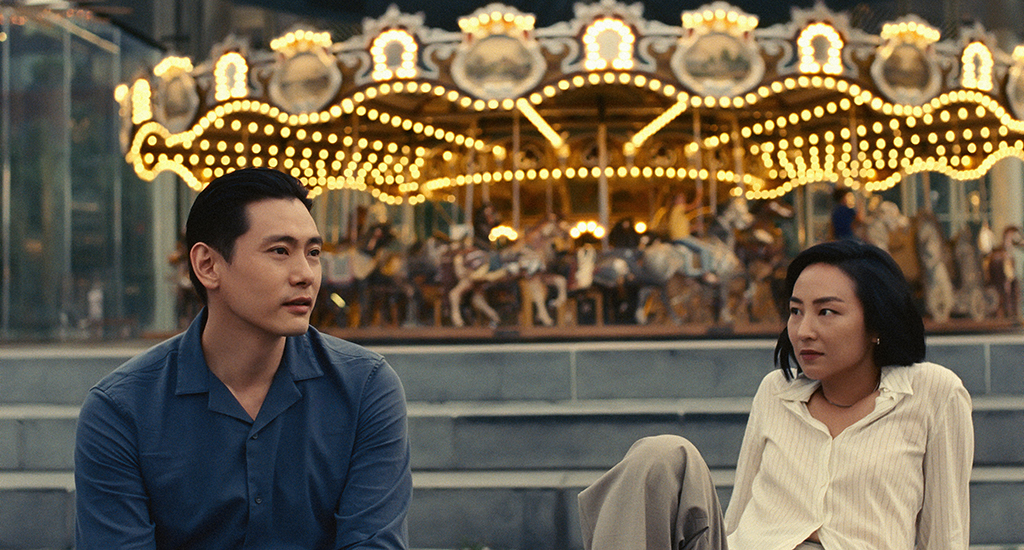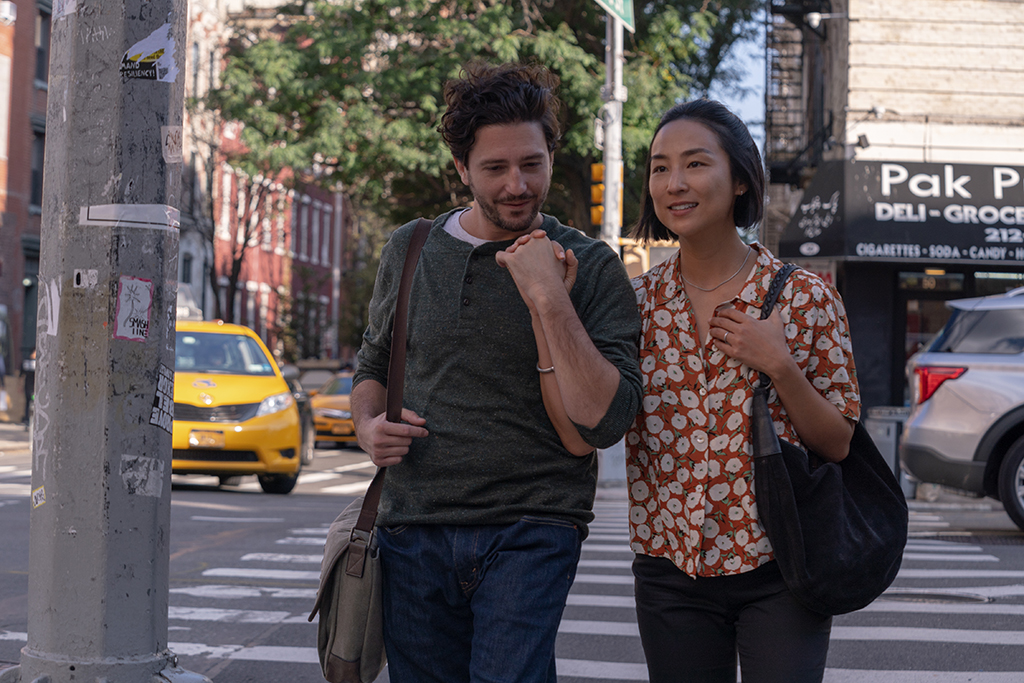By Kai Curry
NORTHWEST ASIAN WEEKLY
“Past Lives,” written and directed by Korean Canadian Celine Song, and the opener at Seattle International Film Festival this year, is without a doubt the most grown up movie I have ever seen—and that you will ever see, too. It chronicles the life and love of Nora, whose family emigrated from Korea when she was a child, thus cutting off her life and starting a new one.
The movie begins with Nora (Greta Lee) as a girl in Korea whose parents are planning to take the family to Canada. Wanting their daughter to first realize her crush on schoolmate Hae Sung (Teo Yoo), the parents of both kids facilitate them “dating”—but too soon, they must say goodbye, forming a near-permanent rift in their lives and hearts. I say “near” because Nora is better able to move on from their childhood love than Hae Sung, though neither move on completely. Thus “Past Lives,” wherein Nora and Hae Sung meet up twice more in their efforts to figure out what they mean to each other. Meanwhile, both have other loves and Nora marries.

Nora (Greta Lee) and Hae Sung (Teo Yoo) explore New York City and what they mean, or meant, to each other. (Screen still courtesy of A24 Films.)
“If you leave something behind, you gain something, too,” the movie says. This is an important lesson, one of many in this contemplative, wise story. The parallels between the real lives of Song and the actors chosen for the film are beyond purposeful—they are serendipitous. Song came from Korea to Canada around the same age as Nora (12) and is now based in the U.S., just as Nora moved to New York City for her writing career. John Magaro, Nora’s white husband in the film, Arthur, is married to a Korean American.
“There’s a piece of her that I’ll never fully be able to understand or never be able to be a part of,” Magaro told the Weekly. “Interracial marriages and relationships are becoming more and more common…sharing ideas and sharing your experience, there’s no bad in that, right?” Yet there will always be differences—language, culture (Arthur charmingly makes the effort to learn Korean)—that cannot be breached.

Nora (Greta Lee) and her husband Arthur (John Magaro) have a full life. (Screen still courtesy of A24 Films.)
Teo Yoo is familiar with what it’s like to have more than one homeland. He was born and raised in Germany, but has lived in Korea for the past 15 years, while pursuing acting. He relates to Hae Sung’s loneliness, but even more to Nora’s immigration story.
“Maybe in my younger years, it was a reason for damage, but having become…a little older…I think it’s also a privilege, you know?” Yoo told the Weekly. He sourced his own experience to give Hae Sung a strong sense of melancholy.
“This film is for everyone who understands love because what comes out of that [means] you can also understand…heartache and you can understand longing,” Yoo said. “It’s especially for everyone who has ever questioned their own destiny.”
Add to this felicitous casting Song’s own determination to pursue her singular vision in the creation of what is her first feature film. Lee shared with the Weekly Song’s directorial initiative that neither Magaro nor Yoo should meet each other until their characters meet in the story.
“It began to feel like I was in two different movies with each of them,” she said. Thus, Nora was able to interact with Hae Sung and Arthur separately, as she would have in life—and their awkwardness once all in the same room—a scene that mirrors an epiphany Song had in a bar, wondering what people would think, watching her from the outside—is completely real.
Hae Sung and Nora’s first effort to reconnect happens online. It is one of the most accurate portrayals of online long distance romance I have ever seen, down to denial by both parties that they are dating at all—even though the hurt feels like they are when Nora decides to call it off. She is spending too much time obsessing over Hae Sung and not enough on her future. Nora is “unapologetically ambitious” and “very steadfast,” Lee described. “It’s been such a privilege to honor this modern woman who knows what she wants.” She’s free of “flourishes” that could prevent a script from getting to the “core of that woman as a human. She’s entirely liberated,” Lee said, and while Nora has an unsettling moment with Hae Sung, thinking she is both more and less Korean with him, she is able to “live in that space…in a beautiful way.”
In the second phase, many years later, Hae Sung comes to New York. By this point, Nora is very much removed from her “past life” with Hae Sung in Korea and who she was then. But she is wistful and she is conscientious of the respect owed to their childhood bond. Song ignored any and all temptation to consummate this relationship. They are all adults through and through. Perhaps Hae Sung, awkwardly shifting on his feet, a fish out of water in the U.S., is the most childlike, also in the sense that he seems not to have gotten over Nora. But he is a perfect gentleman and bows to Nora’s decision when she tells him that part of their lives is over.

Childhood love lasts forever, as Young Nora (Seung-ah Moon) and Young Hae Sung (Seung Min Yim) discover. (Screen still courtesy of A24 Films.)
It’s Arthur who is the possessor of a fuller relationship with Nora, and a healthy one.
“He could have been the enemy character,” Magaro pointed out, which would have been exacerbated by him being white, but instead, he and Nora have a “very supportive” relationship. In a remarkable and uncommon gesture of generosity and understanding, Arthur accedes to Nora’s wish to spend time with Hae Sung. As Lee and Song explained, the last thing Nora is going to do is upend her personal and career success, but she is going to explore what Hae Sung and Korea mean to her.
“The intention is to describe as accurately as I can what it’s like to…exist as a person who lives through time and space,” Song shared—and our “multi-continental” connections.
It’s sad, the part of Nora that she has lost, but she has gained a lot, too. Although the story involves Asians and Nora’s immigration experience, and although both—being Asian and leaving one’s home country—shape Nora as a person, “Past Lives” is applicable to anyone who has experienced upheaval, started anew, lost a love. At the core is “in-yun”—the Korean concept of connection which Yoo told the Weekly is common in South Korea to the point of being mentioned almost daily. The “past lives” then are Hae Sung and Nora’s in Korea when they were small, which is gone; and every reincarnation of their souls before and after this one.
“Even though you have some type of struggle in your life and it might turn a bit bittersweet, it’s still okay,” Yoo said. “To be at peace with your circumstances, I think that’s the important thing.” Maybe this time, he went on, two people hold a different hand of cards, but maybe “the next round, they can be on the same hand together. It makes everything a bit more bearable.”
Kai can be reached at info@nwasianweekly.com.




Wow, ‘Past Lives’ sounds like an intriguing movie that delves into the complexities of love. I appreciate how it explores the theme of love from a mature perspective, offering a deeper understanding of its various dimensions. The concept of past lives adds an intriguing twist, making it even more thought-provoking. I’m eager to watch this film and experience the emotional journey it promises to take the audience on. Thank you for sharing this recommendation!
slope game When the film opens, Nora (Greta Lee) is a young Korean girl whose parents are making preparations to go to Canada.